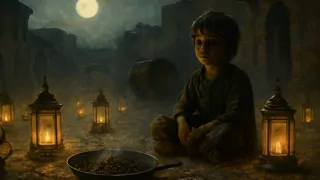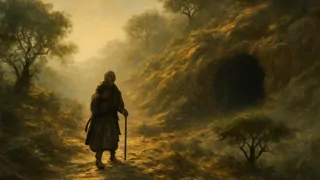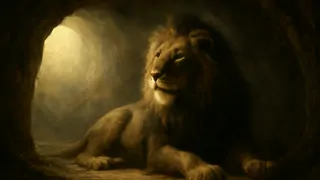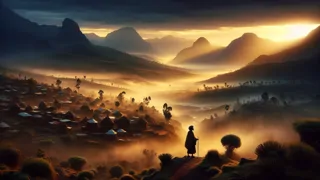Introduction
In the cool first light of dawn, the high plateaus of Ethiopia lay draped in mist and shadow, where ancient rock terraces climb toward distant sky. It was here that Saba, a gentle woman of quiet determination, awoke each morning beneath a thatched roof of reeds, listening to the soft bleating of goats and the low rumble of distant thunder across the escarpment. She had become guardian to young Dawit after his mother’s passing, and though she offered him every kindness—a warm hearth, tales spun by firelight, and fragrant cups of spiced honey wine—his laughter had never returned. In place of a boy’s bright exuberance, a chill grief had settled in his heart, and with every sunrise his silence grew more absolute. Local healers whispered of remedies—dry roots and sweet-infused poultices—but none could pierce the veil of sorrow that had claimed him. When Saba heard the tale of a single lion’s whisker, rare as mountain jasper and said to hold the power of life regained, she felt a spark of hope kindle within her. She resolved to set aside every fear of tooth and claw, to travel beyond the cultivated fields and muster courage at the jagged edge of wilderness, where the king of beasts prowled in golden grass and shadowed ravines. As she filled her leather gourd and bound her simple satchel, the breath of promise and peril coiled in her chest alike, for she understood that some quests demand unflinching devotion if a broken heart is ever to be whole again.
The Son’s Silent Sorrow
Saba had arrived in the small farming village of Amaje just after planting season, bearing gifts of sweet butter and freshly baked injera as was proper for a new mother. Within days, she had grown fond of Dawit, who watched her every gesture with cautious eyes but never spoke beyond a low sigh. On the night of the solstice festival, when drums echoed across yam fields and lantern smoke curled into the velvet sky, the boy stood at the threshold of the gathering and let tears slide silently down his cheeks. Saba offered her shawl and hummed a lullaby, yet his grief only deepened, as though the festival’s light served only to remind him of his own fading joy. In the hush that followed, the elders came, leaning on walking sticks carved with ancestral symbols, and whispered of a remedy that sounded more myth than medicine: the whisker of a lion said to anchor a drifting soul. They spoke of a hidden cave high above the river gorge where a solitary male lion dwelt, his mane both glorious and terrible. No villager had dared to approach the cave for many seasons, but the whisker he shed each new moon was said to capture the sun’s warmth and the land’s ancient pulse. When Saba heard this with her own ears, her heart surged with a fierce resolve. She would find that whisker and bring it home, not as a trophy but as a lifeline for her son’s wounded spirit. Though neighbors implored her not to venture into lion territory, she answered only with a gentle smile and words of promise whispered to the empty hearth: "I will bring him back his laughter." This vow carried her forward, beyond the village’s boundary stones, into wild heath that trembled with unseen life.

Journey into the Highlands
At first light, Saba crossed terraces of red clay and gold grain fields that gave way to rocky trails dotted with juniper and acacia. The sun held barely a promise through drifting clouds, and each step upward deepened her solitude. She paused at a shepherd’s encampment, where the old man offered her a handful of roasted barley and a tale of lions glimpsed at twilight on the far ridge. His voice was low, carried by wind and memory, but he could not recall ever seeing one venture beyond the wind-swept ridge above the gorge. Still, he blessed her journey with an old prayer, coiling his knotted rosary around her wrist, and she pressed on. By midday the trail narrowed to loose shale, and clouds rose around her like ghostly flocks of sheep. She felt the air thicken with silence—the kind that tenses muscles and quickens the pulse. Somewhere ahead lay the cave, its mouth half-hidden behind a tangle of thorn and wild mint. She paused, gathering courage, and gave a soft offering of roasted ground coffee to the spirits of the land: three grains for protection, one for guidance, and one for safe return. Then she followed the animal tracks that cut across the bluff, careful to leave no footprints of her own—an act of respect for the king she sought. A sudden snarl rent the quiet, and her heart leaped as she saw golden eyes gleaming from the underbrush. The lion emerged, his mane like bronze fire, muscles rippling beneath tawny fur. He moved with the confidence of centuries behind him, pausing only long enough to growl—a deep, resonant sound that shook stones underfoot. Saba stood perfectly still, humility and fearless intent anchoring her feet. She remembered the healer’s words: show no fear and make no sudden move. Instead, she bowed her head and spoke softly in Amharic, offering her plea: "Great father of the wild, lend me the gift that mends a child’s heart." He sniffed the air, lowered his great head in what felt like consent, then turned and padded toward the cave entrance, where he paused again, eyes fixed on her. In that moment, she sensed the thin thread of trust that bound one living soul to another, and she followed him into the half-light of the den.

The King’s Gift
Inside the den, the floor was cool and the air smelled of warm earth and fur. The lion lay sprawled on a bed of scraggly grass, one paw raised to rub a whisker dislodged by the grind of rocks. Scattered around him were more silvery strands, each gently curved like a slender reed. Saba fought the urge to exclaim, steadying her breath and reminding herself of the healer’s counsel to proceed with gratitude and humility. She pulled from her satchel a small bowl of sweetened spiced milk—a customary tribute to honor the lion’s strength. With hands that trembled only slightly, she placed it at a respectful distance and stepped back to watch. The lion raised his head, sniffed the offering, and gently lapped at it. His muscles rippled beneath his hide as he drank, eyes never leaving hers. When the bowl was empty, he stretched and settled back on the grass. Saba moved forward with reverence, eased her palm beside the loose whisker, and plucked it in a single swift motion. The hair gave no resistance, and she whispered thanks as she wrapped it in a piece of clean cloth. For a heartbeat, the lion regarded her in silence, then rose to his full height and brushed past, inviting her to follow. At the mouth of the cave, he paused once more before retreating into dusk, leaving Saba alone with the precious strand. She stowed it carefully, placed another handful of coffee grains at the den’s threshold in gratitude, and turned her face toward the path home, feeling the weight of hope settle along her spine.

Conclusion
With the lion’s whisker cradled in her palm, Saba descended the ridges at sunset, the sky painted in ribbons of ochre and violet. Each step carried the blessing of the wild, and by the time she reached Amaje, night candles flickered in its mud-brick homes. Dawit, pale and silent since he had slipped back from childhood, looked up from his cot when she whispered his name. Carefully, she placed the whisker into a simmering pot of honeyed tea, reciting the healer’s words: that compassion, offered with true intent, could weave a new thread of life into a broken spirit. When even a single drop of the infusion touched his lips, a warmth bloomed in his chest—a gentle glow that chased away the lingering chill of grief. Slowly, his eyes brightened, and at dawn’s first light, the villagers heard a small, delighted laugh ring through the courtyard. Saba held Dawit close, tears of relief filling her own eyes, as the promise of a new season bloomed in their hearts. In the glow of that morning, mother and son stood together beneath the rising sun and knew that courage, love, and a lion’s gift had turned sorrow into hope.


















